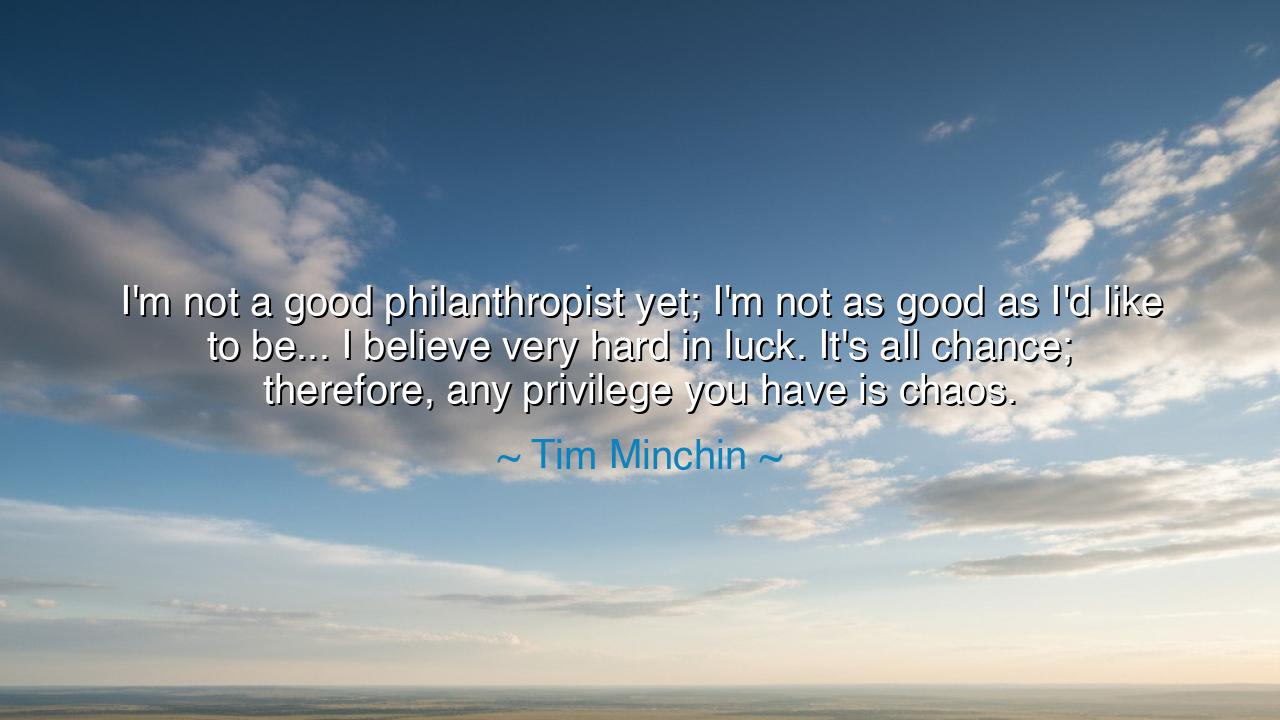
I'm not a good philanthropist yet; I'm not as good as I'd like to
I'm not a good philanthropist yet; I'm not as good as I'd like to be... I believe very hard in luck. It's all chance; therefore, any privilege you have is chaos.






In the grand journey of life, where we strive to understand the nature of existence and our place within it, there lies a deep and unsettling truth: luck, chance, and privilege are forces that shape us far more than we often care to admit. Tim Minchin, in his reflection, speaks candidly to this reality when he says, “I'm not a good philanthropist yet; I'm not as good as I'd like to be... I believe very hard in luck. It's all chance; therefore, any privilege you have is chaos.” In these words, Minchin touches upon a profound understanding of the human condition—that the advantages we possess in life are not earned through inherent virtue or personal merit alone, but often through the chaotic and unpredictable forces of chance.
Ancient wisdom has long grappled with the nature of fortune and privilege. The Greeks, with their stories of gods and heroes, often depicted fate as a capricious force, unyielding in its unpredictability. Zeus, the king of the gods, was seen as the ultimate arbitrator of fortune, bestowing favors upon some and hardships upon others, without explanation or reason. The ancients understood that while we may strive for greatness or moral goodness, we are all subject to the whims of fate. Minchin’s words echo this age-old recognition: no matter how hard we work, no matter how good our intentions, we are often carried along by forces beyond our control. The privileges we enjoy in life, whether they be wealth, health, or status, are as much the result of chance as they are of our own efforts.
Consider the story of King Croesus of Lydia, whose wealth was legendary. Croesus believed that his immense fortune was a sign of his superiority, a reward for his wisdom and greatness. However, as history would have it, his fortunes were reversed when he made the fateful decision to challenge Cyrus the Great of Persia. His wealth and status, once the envy of the known world, were destroyed in an instant, proving that even the most powerful rulers are vulnerable to the whims of chance. Croesus’ downfall serves as a reminder that privilege, even at its zenith, is not permanent—it is a chaotic force that can change in the blink of an eye. Similarly, Minchin’s reflection on privilege as chaos underscores the fleeting and arbitrary nature of fortune.
Minchin also speaks of his efforts at philanthropy, admitting that he is not yet the benefactor he would like to be. This is a humbling acknowledgment of his awareness of the imbalance between his privileges and his efforts to share them with others. In the face of luck and chance, it is easy to fall into complacency, to believe that one’s privilege is deserved and that others should simply strive harder to earn their place. Yet, Minchin challenges this belief by recognizing that his privileges—his success, his resources, his opportunities—are often the result of chaotic circumstances beyond his control. This realization calls him, and all of us, to greater humility and action, to acknowledge that we are not separate from the suffering of others, but connected through the unpredictable forces of fate.
The great philanthropists of history, such as Andrew Carnegie, John D. Rockefeller, and Oprah Winfrey, have all recognized the duty that accompanies privilege. These figures, who amassed great wealth and influence, used their resources not just for personal gain, but to uplift those in need. They understood that the privilege they enjoyed was not entirely of their own making, and therefore, they had a responsibility to share their abundance with those less fortunate. However, even their acts of generosity were shaped by chance—by the opportunities they were presented, the timing of their rise to power, and the unpredictable forces that guided their paths. Their philanthropy was an acknowledgment of their awareness of the chaos of privilege—and the moral imperative to use it for the common good.
In our own lives, we must embrace Minchin’s lesson: to acknowledge the role that luck and chance have played in our own success. The privileges we enjoy are not solely the result of our efforts, but also of factors beyond our control—our birth, our circumstances, the opportunities that arose unexpectedly. By recognizing this, we open ourselves to a deeper understanding of justice and humility, realizing that the world is not as fair as we might wish it to be. Minchin calls on us not just to recognize our privilege, but to act upon it, to use what we have been given to create a more equitable world for all.
Thus, the wisdom passed down through Minchin’s words calls us to reflect on our place in the world, the chaos that surrounds us, and the profound responsibility we carry. We must act not out of guilt, but out of a sense of moral duty—to recognize that privilege is not a right to be hoarded, but a gift to be shared. Let us not turn a blind eye to the chaos of life’s circumstances, but instead, let us take action to bridge the gap between chance and justice. By doing so, we honor not only the fortune we have been given, but the greater duty to create a world where fortune is shared, and where all can find their place, regardless of the unpredictable forces that shape their lives.






AAdministratorAdministrator
Welcome, honored guests. Please leave a comment, we will respond soon